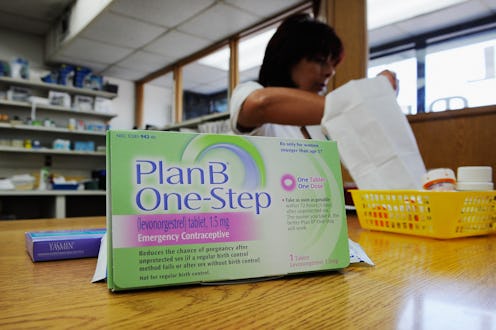News
SCOTUS Takes Up Notre Dame Contraceptive Challenge
The subject of women's health simply isn't going away anytime soon, if certain parties have their way. On Monday, The U.S. Supreme Court instructed the 7th U.S. Circuit Court of Appeals to review a contraceptive challenge out of the University of Notre Dame, in order to determine whether the school would be required to authorize coverage of birth control methods for students and employee who carry outside insurance, reported The Catholic Sun. The challenge comes nine months after the infamous Hobby Lobby decision (ironic, we know), in which the Supreme Court ruled that the business would be exempt from federal coverage mandates requiring that it provide full coverage of contraceptive methods in employee healthcare plans, on the basis of religious freedom.
It's just the latest step back on the crucial and weighty issue of women's health, but it's not surprising. Several well-established religious and private institutions already require patients to cover the cost of their own birth control, on the religious exemptions. Utah-based Mormon college Brigham Young University, for example, covers a myriad of health services, such as pre-marital exams and counseling, but does not cover actual contraceptives. "Students do have to pay out of pocket" for such necessities, a representative from BYU's Student Health Center told Bustle on Monday. A few universities, like the Californian evangelical Christian college Biola University, are more lenient: on Monday, a Biola spokeswoman told Bustle that traditional contraceptives were indeed covered under both student and employee plans — but the college still does not provide coverage for the morning-after pill or other similar methods.
For many private universities, the decision whether to offer coverage of contraceptive methods is a relatively fair and simple one, given the fact that they are, indeed, run by religious organizations. Notre Dame's claim, although trickier, may end up falling under the same guise.
The premise is a conflicted one: while many argue that universities have the responsibility of protecting student health, whether or not they pay for the contraceptives themselves, others maintain that it should be up to the schools on how to interpret that portion of the Affordable Care Act. In a statement to U.S. News in 2012, Director of the Center for Human Dignity at the Family Research Council Jeanne Monahan defended the exemption of religious universities from any semblance of birth control mandates, calling the standard requirement an "affront to religious freedom."
"Religious liberties and the ability to follow one's conscience have always been protected rights in the [United States] until now," said Monahan.
On Monday, Reuters reported that many religiously backed institutions are still concerned about the extent of the protections afforded to them under the Religious Freedom Restoration Act, which allows organizations to "certify they are opting out" from federal contraceptive mandates, at which point insurers would then be required to take up the costs themselves.
Notre Dame, however, says that the opt-out method simply doesn't go far enough. By requiring universities to give the green light for birth control coverage, even without the school's financial assistance, it gives the appearance of consent, some argue. It's a tough case of splitting hairs, at least on SCOTUS' end.
Others are confident that a decision in the school's favor will eventually be handed down. "[Monday's action sends] a strong signal that the Supreme Court will ultimately reject the government's narrow view of religious liberty," said religious rights lawyer Mark Rienzi, who works with the Becket Fund for Religious Liberty, in a comment to Reuters on Monday.
The decision whether to exempt religious institutions from authorizing outside contraceptive coverage may seem like an easy "no" for the lower court. But if history is any indication, the fight might be far from over, no matter the final ruling.
Images: Getty Images (2)
